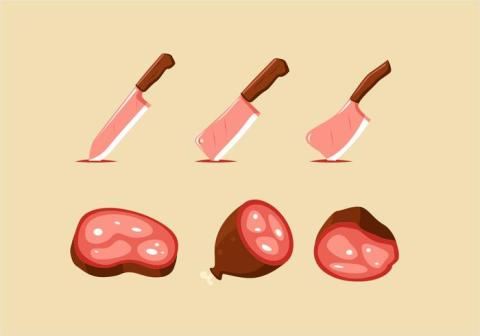
Writers, I’ve found, are usually creatures of habit. So, apparently, are butchers. Let me explain.
Every early morning when I settle into my study with a cup of coffee to write I do these things in this order: a quick check of email to see if my agent or the Pulitzer Prize committee has gotten in touch (only the agent has shown up so far), a glance at my notes, and finally a look at where I am in a project (I make it a practice to stop writing in the middle of a thought, or even in the middle of a sentence, so the next morning I have something specific to do other than stare at a blank page or screen). That little set of rituals has long proven to be a pleasant and productive way to start my day.
I’m pretty sure my devotion to such a daily routine began a long time ago in a country butcher shop.
My initial foray into the working world came when I was a freshman in high school and had – to my father’s way of thinking – way too much time on my hands. So he had a word or two with Nubbin Eldridge, who he had coached and taught years before and who owned a grocery store in our little town. Nubbin hired me to sack groceries, stock shelves, sweep the floor, and unload the A&P truck that backed up to the door every week. But it didn’t take me long to gravitate back to the meat market, where I ended up being the butcher’s helper.
The butcher, a chain smoking, middle-aged fellow who had worked in no telling how many stores throughout East Texas, was grumpy and sluggish at the start of each day but, by the end of it, he was downright jovial. He just liked his work, I figured, and once he got into the swing of things was glad to be about it. During the fall, we’d process deer for hunters. And by the end of those twelve and thirteen-hour days, the butcher would be absolutely festive.
I liked it, too. My first duty upon arrival was to grind fresh sausage and hamburger meat and pat it into long pans to go into the display case. Then I’d make crisscross patterns on the tops with the edge of a knife. Next, I’d slice a bunch of smoked bacon on the big saw, along with a dozen or so thick pork chops. I liked that set of rituals, and actually looked forward to them.
I watched that butcher like a hawk to learn how to break down a side of beef, cut the various chops and roasts, and what pieces could be used in ground beef and what should be cubed into stew meat. A big wheel of oily, yellow cheddar in a thick red rind and a crock bowl of hog’s head cheese sat always on top of the meat case, and in the walk-in cooler there was a waxy, brown box full of iced-down chickens. But nobody in Oakwood ever asked for cheddar or head cheese or chickens. They said they wanted rat cheese, souse, or a fryer, all pieces of a unique lexicon that I had to master, along with “two bits worth” and “leave some gristle on for juice.”
The best part of that first job was getting to talk to everybody in town over the top of the meat case and hearing all the gossip that generally fluttered through our town like dry leaves on a windy day.
The worst part was cleaning out the meat saw. It was a tall contraption with a band blade, and great piles of meat and bone particles were the byproducts of its squealing activity. So every day I’d have to get down on my knees, dig all that gunk out, and scrub the whole thing sparkling clean with vinegar. It was during one of those purifications that I discovered a couple of small empty whiskey bottles, which explained the butcher’s improved attitude every day.
I handed the bottles over to Nubbin and, when the butcher got to work, he confronted him with the evidence. Since he hadn’t had time to medicate himself, the butcher was in a foul enough mood to take sufficient umbrage to the allegation to wave a gigantic meat clever in his accuser’s direction. Which didn’t deter Nubbin one bit. He was a World War II veteran and a Church of Christ preacher, and he wasn’t about to be intimidated by a rummy butcher. So he grabbed a hoe handle that we used to knock cobwebs and wasp nests down in the storeroom and bopped him soundly on the head with it.
When he came to, the butcher went on about having a concussion, then went on about hiring a lawyer, and finally just went on to another town. And, soon, I was working for another butcher who was in as lousy a mood when he left as when he arrived.
My pay for that first job was a dollar an hour. A little research on my part years later turned up an interesting tidbit: the minimum wage at the time was a dollar and a quarter. I kept that job all though high school and never got a raise. But I never got bopped on the head either.
I like your practice of ending your daily writing in the middle of a thought or a sentence. I have always stopped after getting the thought or idea on paper and then having a hard start the next time I sat down. I’ll try your way and see where it leads me.
LikeLike